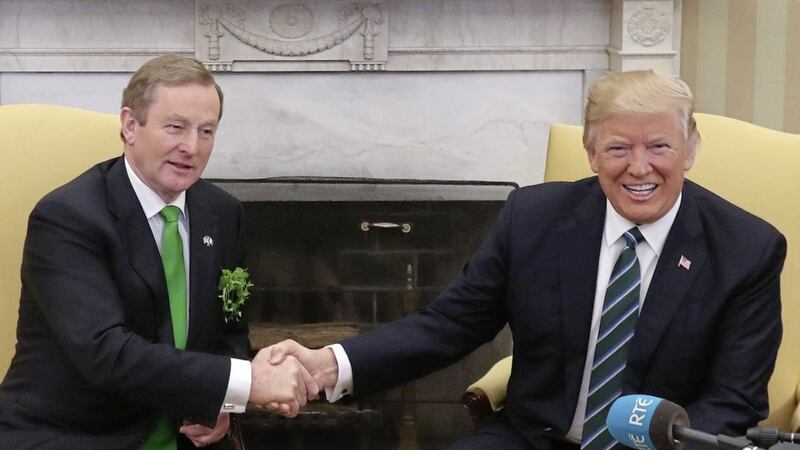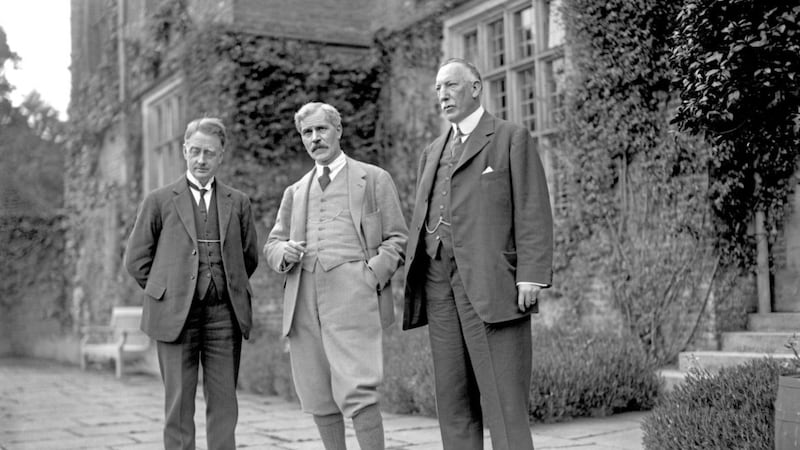THE annual St Patrick’s Day visit to Washington by the head of the Irish government is an even more significant event than many people realise. In his 2005 memoir, entitled DC Confidential, a former British Ambassador to the US, Sir Christopher Meyer, describes how it aroused “the envy of the Greeks, Italians, Scots, Spaniards, Armenians, Chinese, Portuguese” among many other governments and ethnic groups. He continues: “Only Jewish America had a tighter grip on American politics.”
There is a question-mark over this year’s visit because of the pandemic, or as Private Eye magazine satirically terms it: ‘World War Flu’. The White House issues the invitation about a month in advance and, in normal circumstances, it would probably arrive next week. Given the emphasis he places on his Irish background, one would expect the current president to be keen for the event to go ahead, even under restrictive conditions. Don’t forget that when a British reporter requested “a quick word for the BBC”, Joe Biden smilingly replied: “I’m Irish!” However, the president also takes very seriously the measures to deal with the coronavirus: he wears a mask rather more often than his predecessor, for example.
There is said to be considerable anxiety in Irish government circles about potential public fury if Taoiseach Micheál Martin made the trip. This would be at a time when people who cross the border from north to south without a reasonable excuse can be fined €100 (Sterling equivalent £88). But it is a serious necessity for Ireland to retain its prominent position on the White House guest-list.
One of the high points of the visit in normal times is the ceremony where a bowl of shamrock is publicly handed over to the president by the taoiseach on or close to March 17. The presentation took place in private last year but the shamrock-bowl was prominently displayed on a table in the Oval Office of the White House while then-taoiseach Leo Varadkar and former President Donald Trump took questions from the media.
As a reporter, I was in the White House several times for the St Patrick’s get-together during the Clinton years and once in the days of Barack Obama. In that pre-pandemic era it was a great social occasion where you always looked twice at the guests because it might be someone you had seen in a movie or a major political figure.
I still have a vivid memory of President Clinton quoting at length from the works of Seamus Heaney: extracts he had clearly learned by heart. This was yet another reflection of how much he took Ireland and the northern peace process to heart. It all seemed to stem from his visit to both parts of the island in 1995 and the amazing welcome he received: the late Frank McCourt, author of Angela’s Ashes, summed it up for me with the words, “A needy man met a needy people.”
The programme of events in Washington wasn’t confined to the White House and I recall a dinner hosted by the American Ireland Fund in 1997, a year ahead of the Good Friday Agreement, where the attendance included unionist leader David Trimble, his nationalist counterpart John Hume and Sinn Féin’s Mitchel McLaughlin. George Mitchell, chair of the peace process negotiations, issued an extraordinary and heartfelt plea for the various parties to arrive at an agreement.
Two years later, I was in the US again for the St Patrick’s events when word came through that human rights lawyer Rosemary Nelson, whom I met at the annual Drumcree stand-off, had been killed by a car-bomb in Lurgan. I had a conversation later with former US Ambassador to Ireland, Jean Kennedy Smith: she hadn’t heard the news and, rather touchingly, asked if there was any way she and her brother Ted could send flowers to the victim as an aid to recovery but I had to tell her that Ms Nelson was already dead.
Looking back on it all, you have to draw the conclusion that, without the role played by the US, we might never have had the Good Friday Agreement and the 23 mainly calm and peaceful years we have enjoyed since then. Although there will doubtless be some negative reaction if it is decided to proceed with this year’s socially-distant get-together, it would be deeply unfortunate if it didn’t take place.
Email: Ddebre1@aol.com; Twitter: @DdeBreadun








